BUS5SMM: Integrating Marketing Management and Supply Chain Process
VerifiedAdded on 2023/06/15
|12
|832
|292
Report
AI Summary
This report analyzes the alignment of marketing management with supply chain processes for sustainability, drawing from an academic article and 15-20 authoritative references. It highlights the challenges organizations face in aligning green marketing requirements with supply chain processes, the differing perspectives on sustainability between marketing and supply chain departments, and the importance of feedback between marketing and procurement teams. The report emphasizes the need for stability in the supply chain to achieve a stable and sustainable market position and concludes that cooperation between departments is crucial for sustainable business growth. While the report sheds light on various perspectives, it lacks concrete recommendations for implementation. Desklib offers a wealth of similar resources to aid students in their academic pursuits.
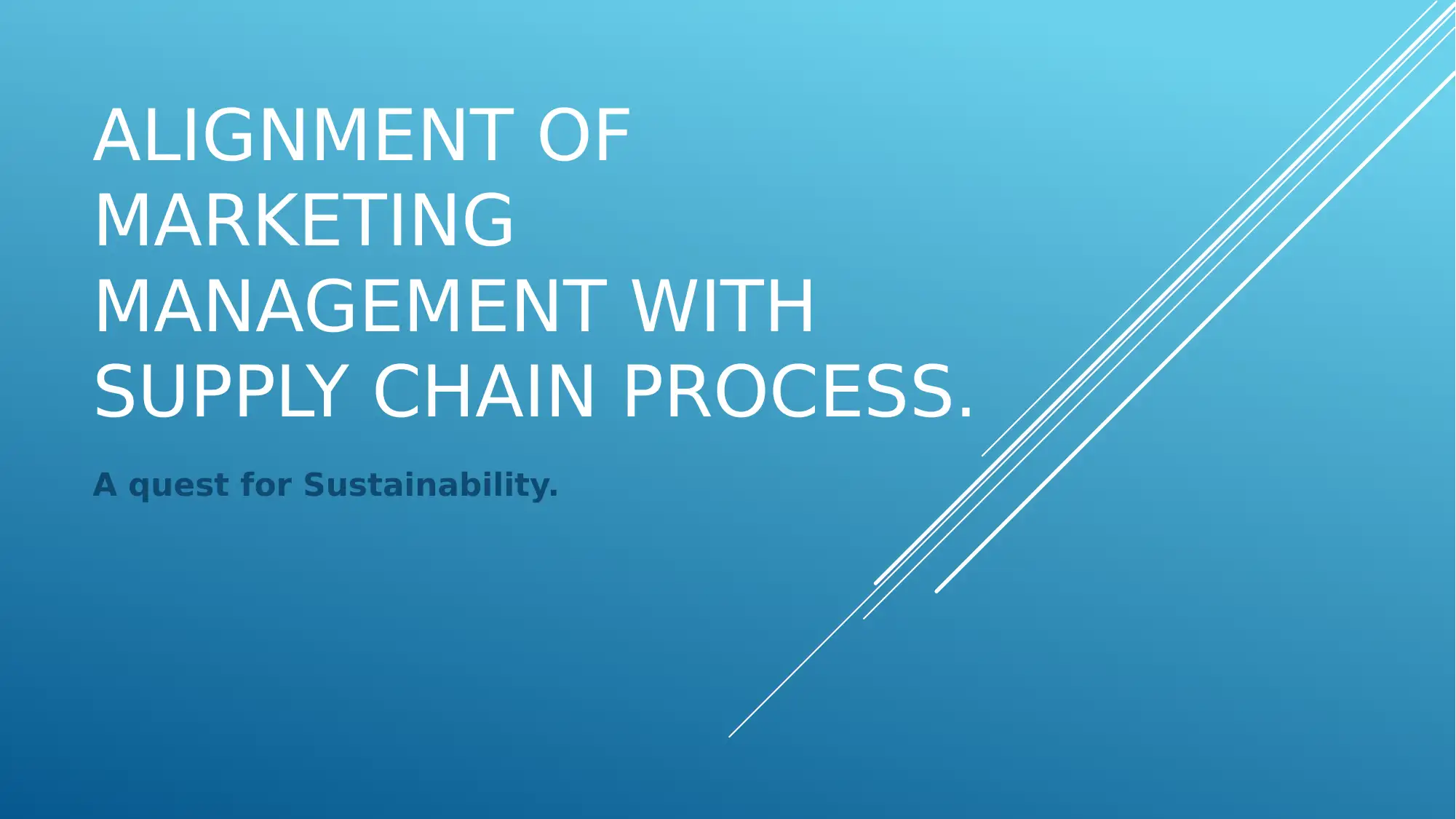
ALIGNMENT OF
MARKETING
MANAGEMENT WITH
SUPPLY CHAIN PROCESS.
A quest for Sustainability.
MARKETING
MANAGEMENT WITH
SUPPLY CHAIN PROCESS.
A quest for Sustainability.
Paraphrase This Document
Need a fresh take? Get an instant paraphrase of this document with our AI Paraphraser
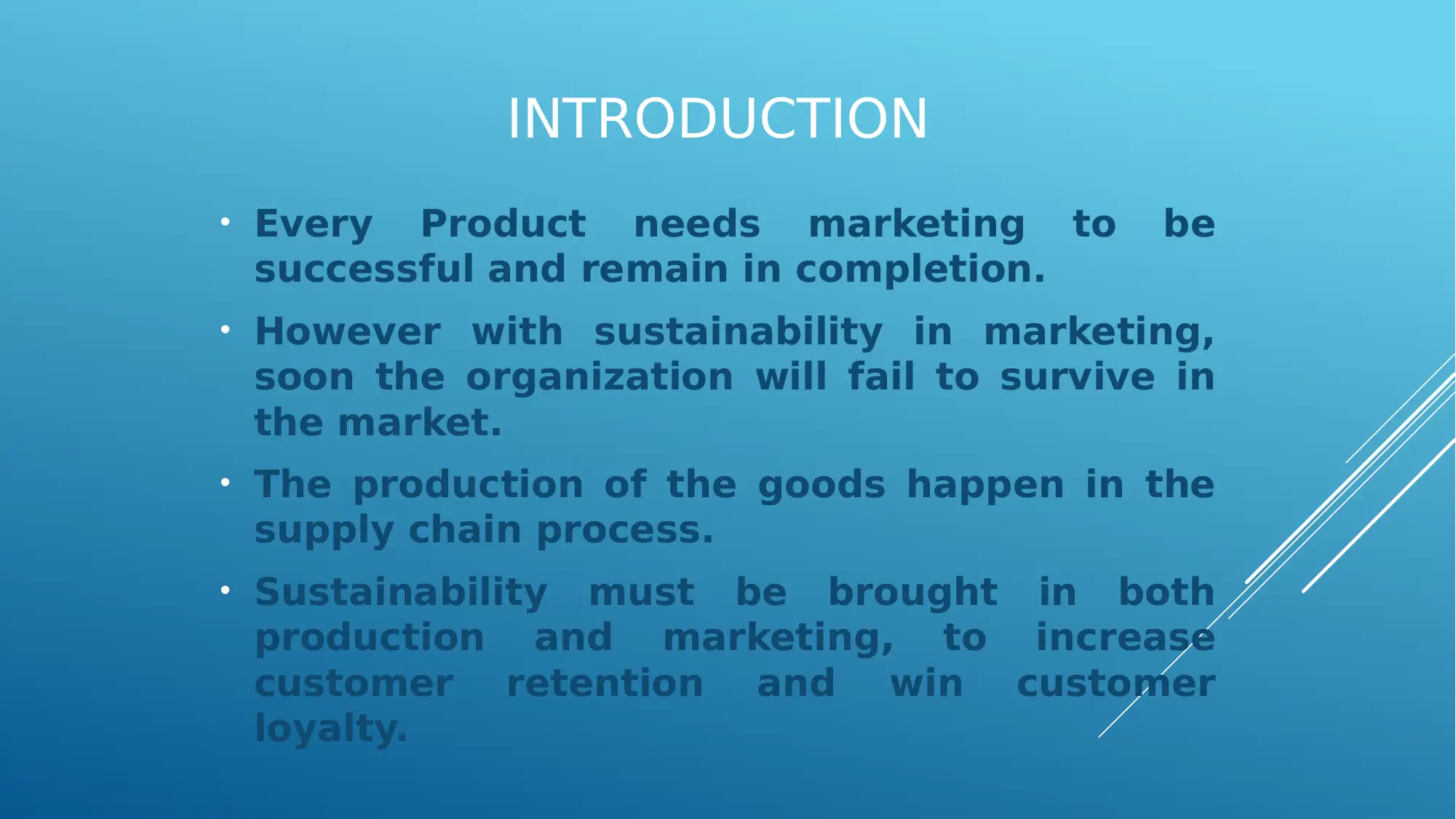
INTRODUCTION
• Every Product needs marketing to be
successful and remain in completion.
• However with sustainability in marketing,
soon the organization will fail to survive in
the market.
• The production of the goods happen in the
supply chain process.
• Sustainability must be brought in both
production and marketing, to increase
customer retention and win customer
loyalty.
• Every Product needs marketing to be
successful and remain in completion.
• However with sustainability in marketing,
soon the organization will fail to survive in
the market.
• The production of the goods happen in the
supply chain process.
• Sustainability must be brought in both
production and marketing, to increase
customer retention and win customer
loyalty.
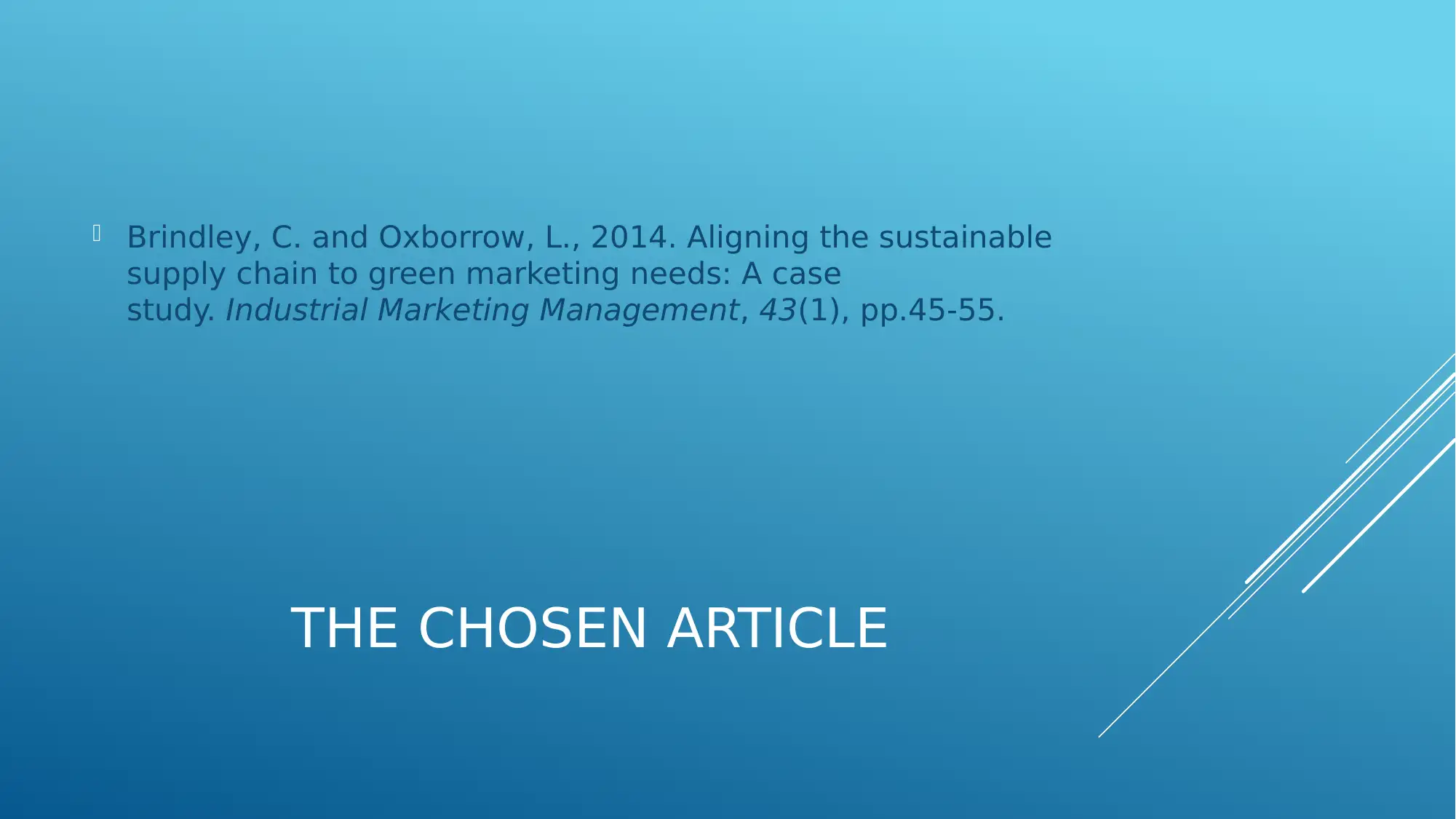
THE CHOSEN ARTICLE
Brindley, C. and Oxborrow, L., 2014. Aligning the sustainable
supply chain to green marketing needs: A case
study. Industrial Marketing Management, 43(1), pp.45-55.
Brindley, C. and Oxborrow, L., 2014. Aligning the sustainable
supply chain to green marketing needs: A case
study. Industrial Marketing Management, 43(1), pp.45-55.
⊘ This is a preview!⊘
Do you want full access?
Subscribe today to unlock all pages.

Trusted by 1+ million students worldwide
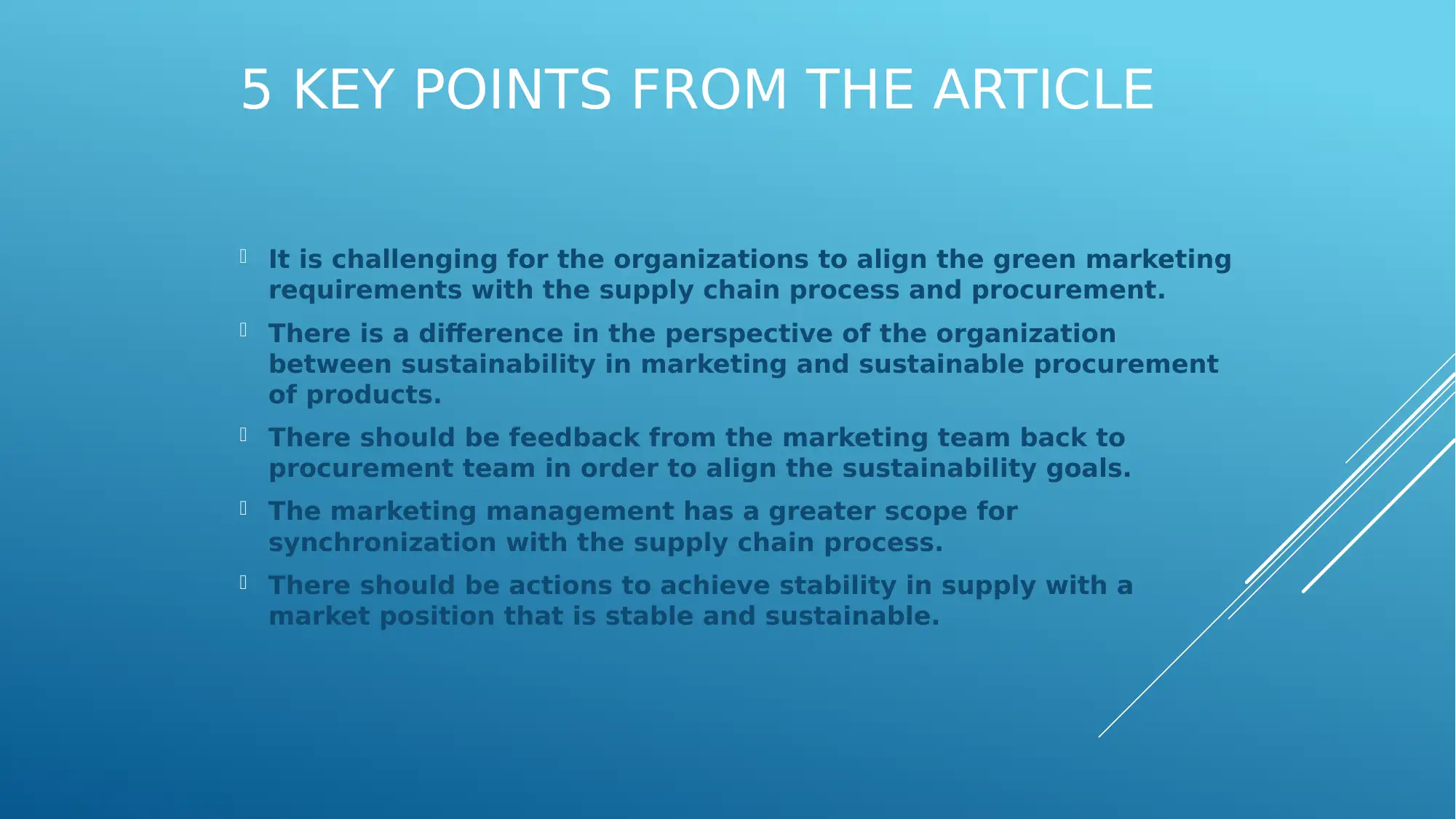
5 KEY POINTS FROM THE ARTICLE
It is challenging for the organizations to align the green marketing
requirements with the supply chain process and procurement.
There is a difference in the perspective of the organization
between sustainability in marketing and sustainable procurement
of products.
There should be feedback from the marketing team back to
procurement team in order to align the sustainability goals.
The marketing management has a greater scope for
synchronization with the supply chain process.
There should be actions to achieve stability in supply with a
market position that is stable and sustainable.
It is challenging for the organizations to align the green marketing
requirements with the supply chain process and procurement.
There is a difference in the perspective of the organization
between sustainability in marketing and sustainable procurement
of products.
There should be feedback from the marketing team back to
procurement team in order to align the sustainability goals.
The marketing management has a greater scope for
synchronization with the supply chain process.
There should be actions to achieve stability in supply with a
market position that is stable and sustainable.
Paraphrase This Document
Need a fresh take? Get an instant paraphrase of this document with our AI Paraphraser
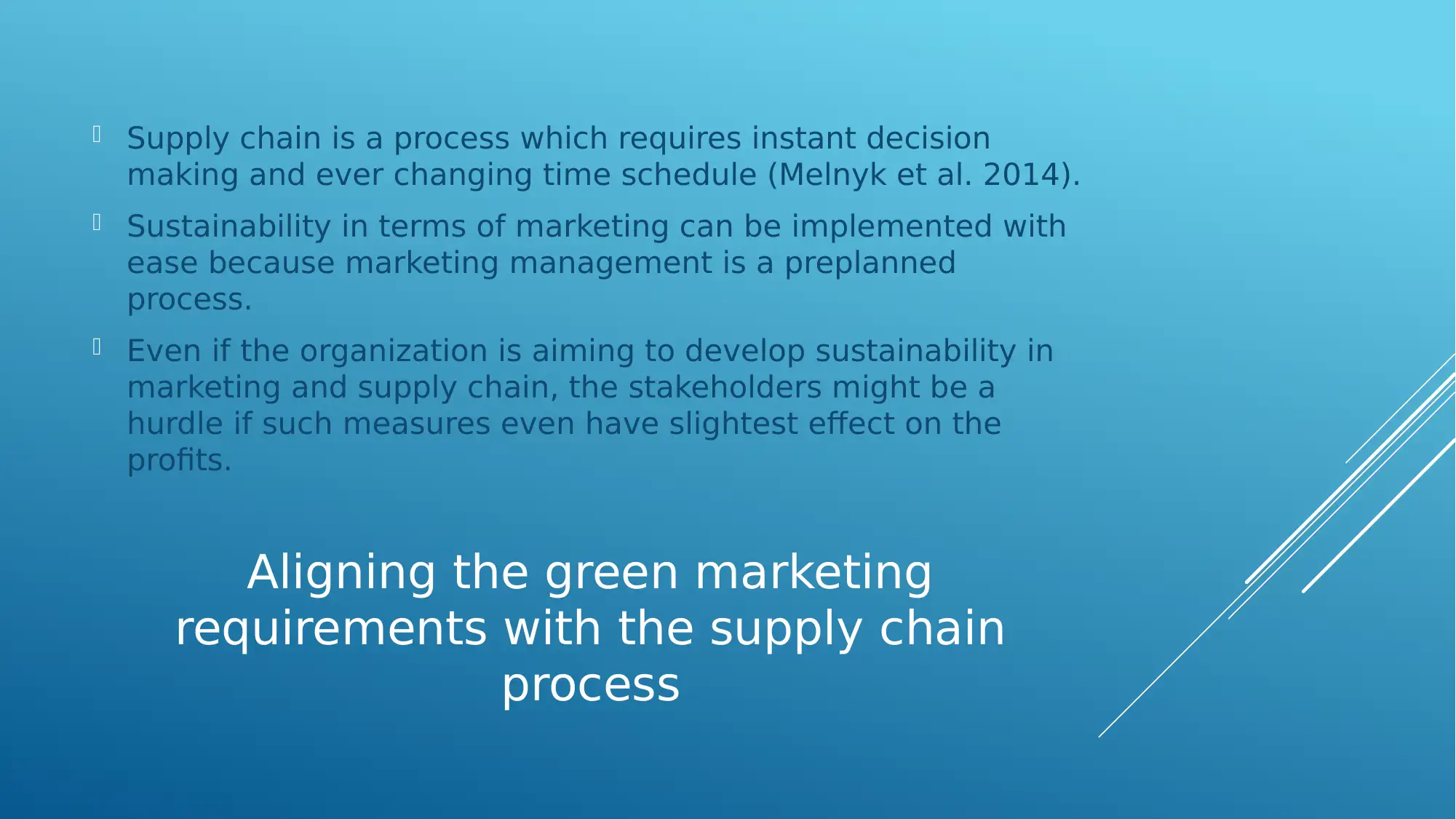
Aligning the green marketing
requirements with the supply chain
process
Supply chain is a process which requires instant decision
making and ever changing time schedule (Melnyk et al. 2014).
Sustainability in terms of marketing can be implemented with
ease because marketing management is a preplanned
process.
Even if the organization is aiming to develop sustainability in
marketing and supply chain, the stakeholders might be a
hurdle if such measures even have slightest effect on the
profits.
requirements with the supply chain
process
Supply chain is a process which requires instant decision
making and ever changing time schedule (Melnyk et al. 2014).
Sustainability in terms of marketing can be implemented with
ease because marketing management is a preplanned
process.
Even if the organization is aiming to develop sustainability in
marketing and supply chain, the stakeholders might be a
hurdle if such measures even have slightest effect on the
profits.
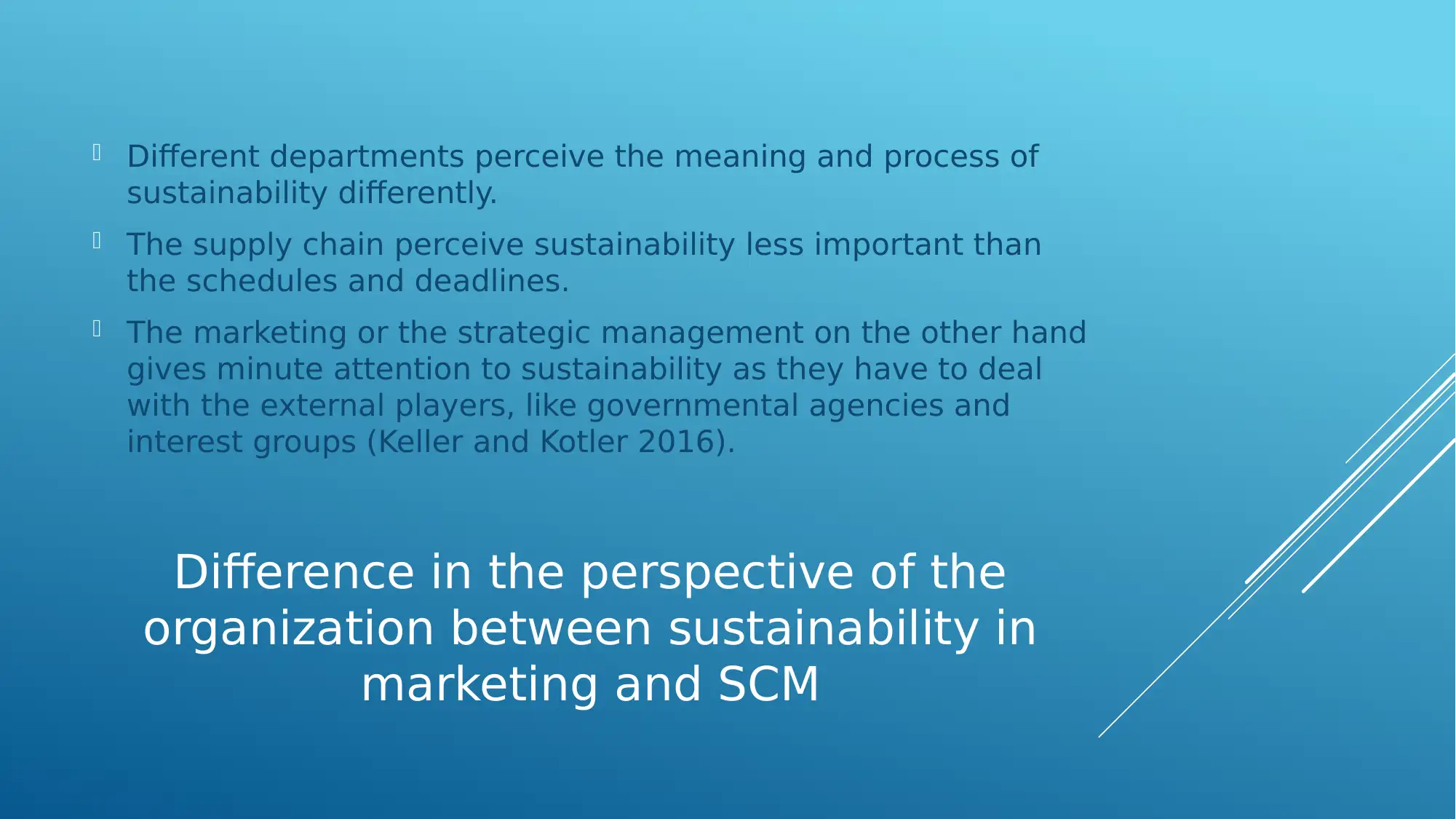
Difference in the perspective of the
organization between sustainability in
marketing and SCM
Different departments perceive the meaning and process of
sustainability differently.
The supply chain perceive sustainability less important than
the schedules and deadlines.
The marketing or the strategic management on the other hand
gives minute attention to sustainability as they have to deal
with the external players, like governmental agencies and
interest groups (Keller and Kotler 2016).
organization between sustainability in
marketing and SCM
Different departments perceive the meaning and process of
sustainability differently.
The supply chain perceive sustainability less important than
the schedules and deadlines.
The marketing or the strategic management on the other hand
gives minute attention to sustainability as they have to deal
with the external players, like governmental agencies and
interest groups (Keller and Kotler 2016).
⊘ This is a preview!⊘
Do you want full access?
Subscribe today to unlock all pages.

Trusted by 1+ million students worldwide
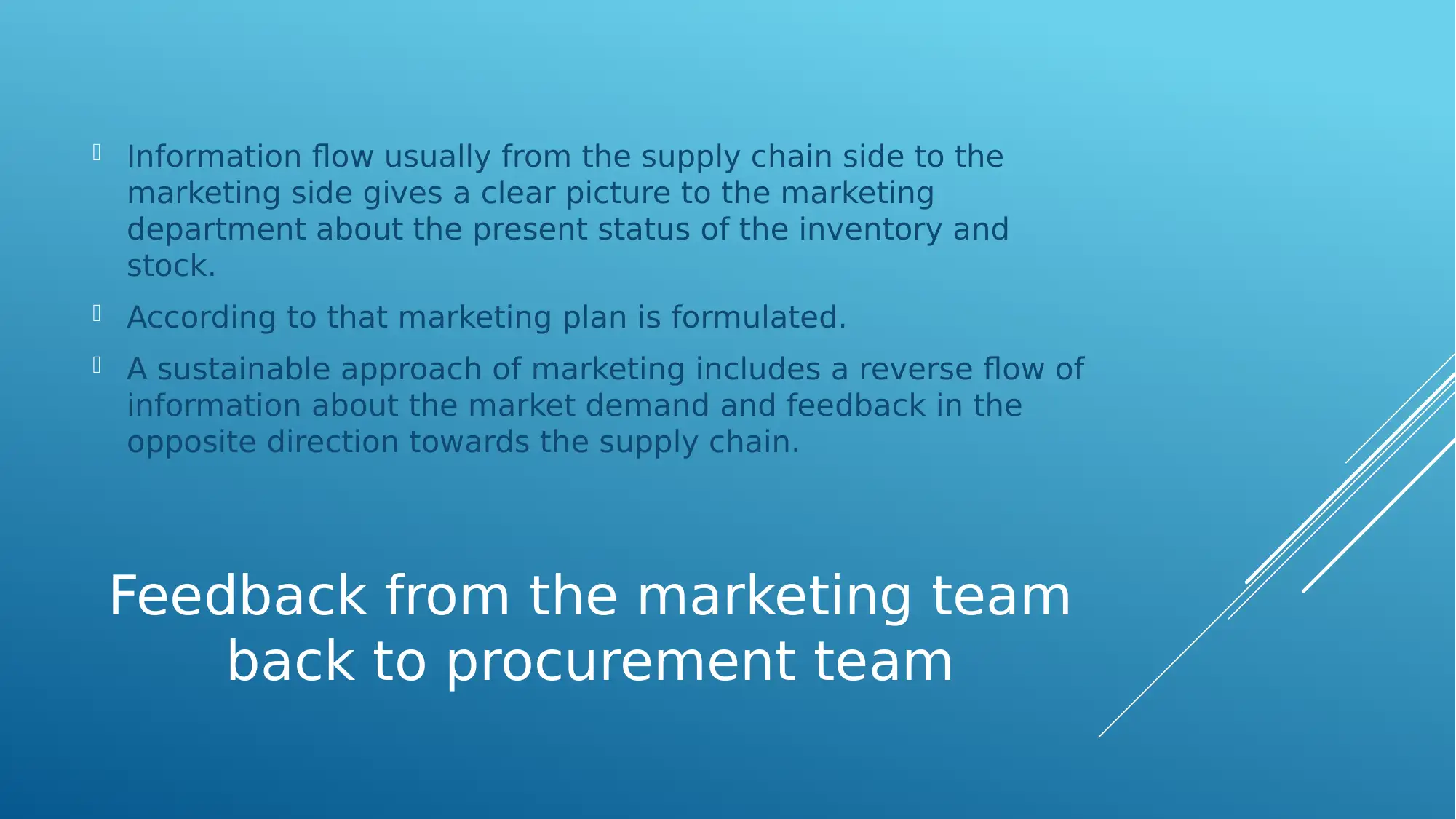
Feedback from the marketing team
back to procurement team
Information flow usually from the supply chain side to the
marketing side gives a clear picture to the marketing
department about the present status of the inventory and
stock.
According to that marketing plan is formulated.
A sustainable approach of marketing includes a reverse flow of
information about the market demand and feedback in the
opposite direction towards the supply chain.
back to procurement team
Information flow usually from the supply chain side to the
marketing side gives a clear picture to the marketing
department about the present status of the inventory and
stock.
According to that marketing plan is formulated.
A sustainable approach of marketing includes a reverse flow of
information about the market demand and feedback in the
opposite direction towards the supply chain.
Paraphrase This Document
Need a fresh take? Get an instant paraphrase of this document with our AI Paraphraser
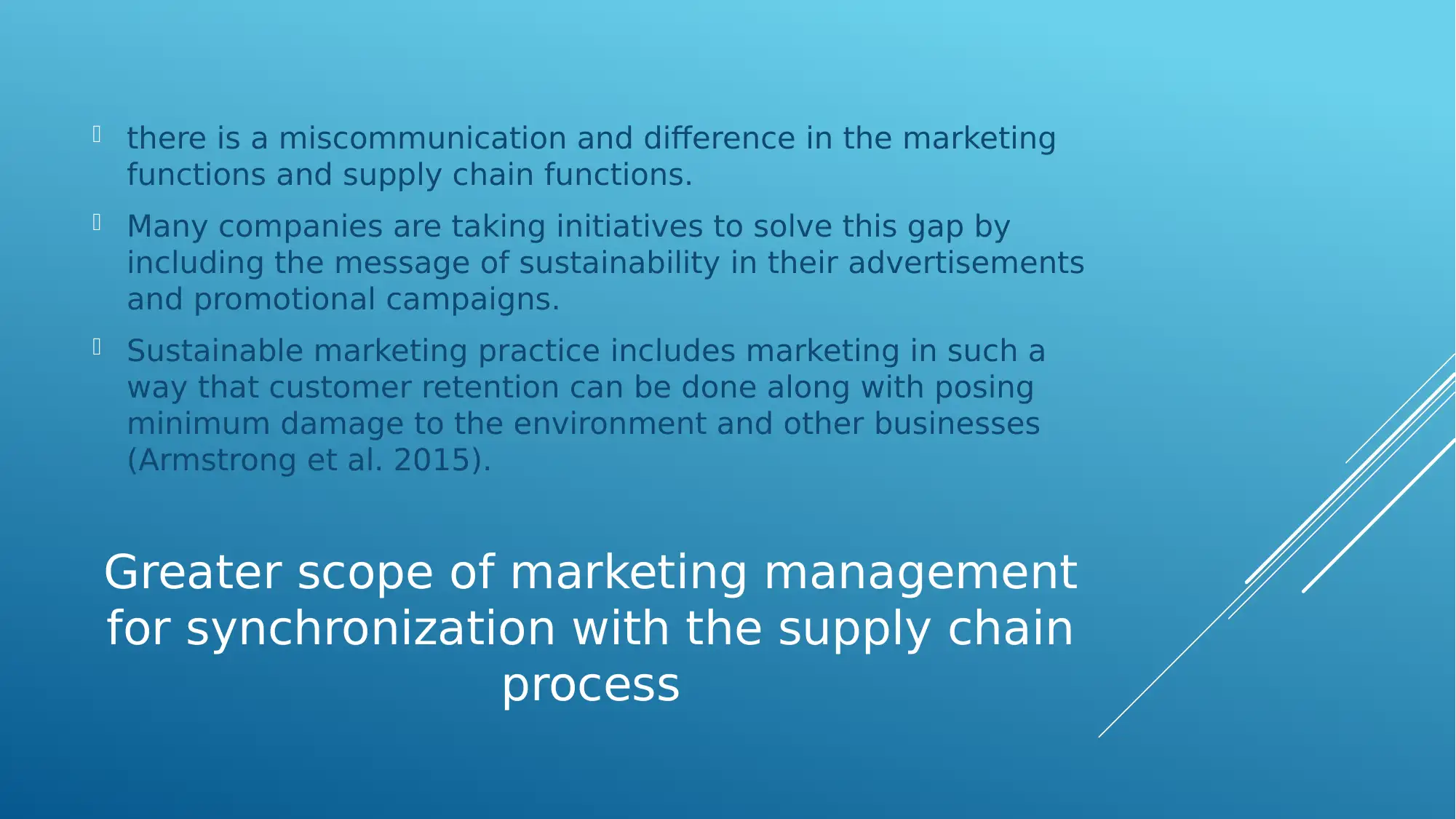
Greater scope of marketing management
for synchronization with the supply chain
process
there is a miscommunication and difference in the marketing
functions and supply chain functions.
Many companies are taking initiatives to solve this gap by
including the message of sustainability in their advertisements
and promotional campaigns.
Sustainable marketing practice includes marketing in such a
way that customer retention can be done along with posing
minimum damage to the environment and other businesses
(Armstrong et al. 2015).
for synchronization with the supply chain
process
there is a miscommunication and difference in the marketing
functions and supply chain functions.
Many companies are taking initiatives to solve this gap by
including the message of sustainability in their advertisements
and promotional campaigns.
Sustainable marketing practice includes marketing in such a
way that customer retention can be done along with posing
minimum damage to the environment and other businesses
(Armstrong et al. 2015).
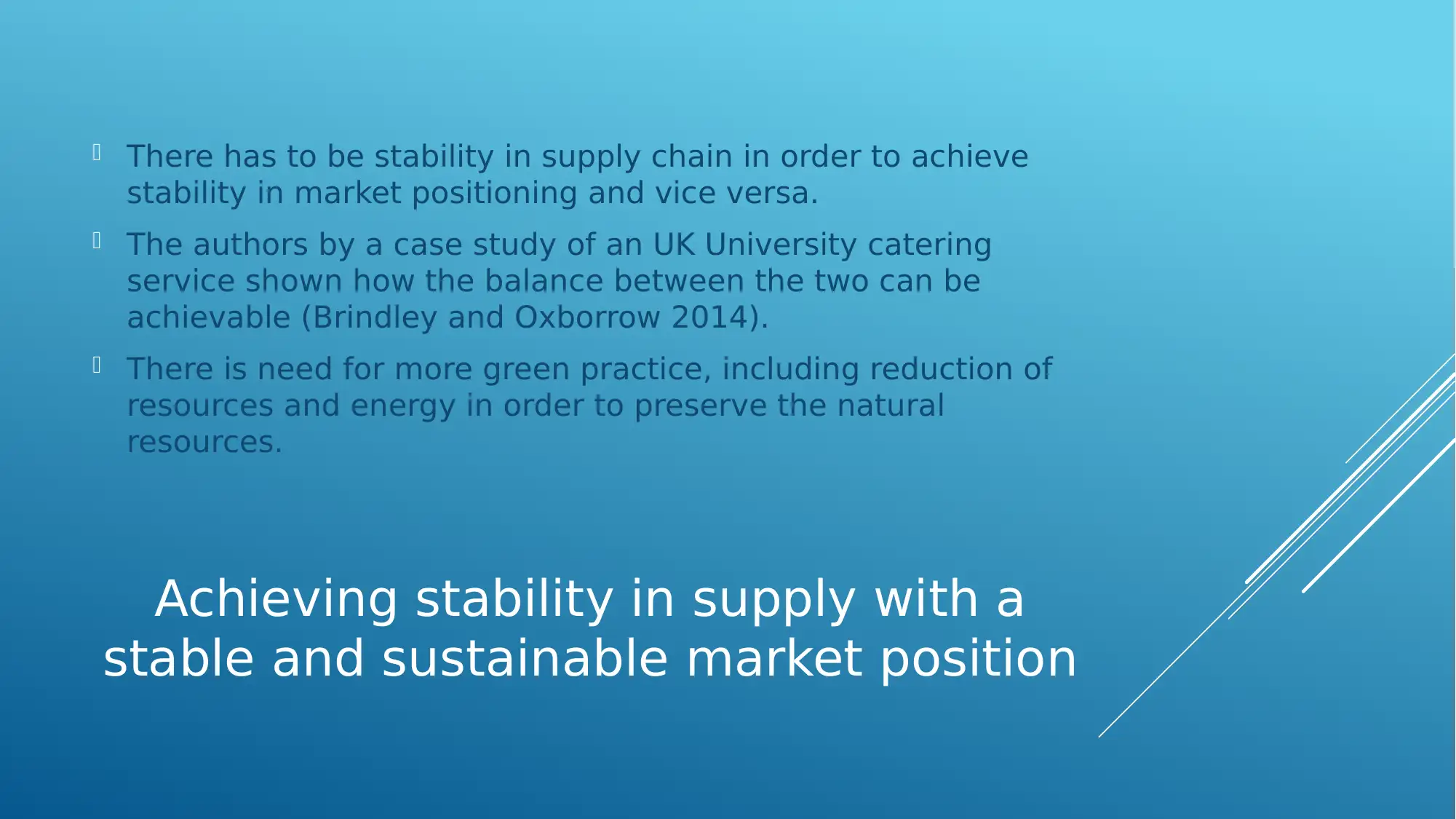
Achieving stability in supply with a
stable and sustainable market position
There has to be stability in supply chain in order to achieve
stability in market positioning and vice versa.
The authors by a case study of an UK University catering
service shown how the balance between the two can be
achievable (Brindley and Oxborrow 2014).
There is need for more green practice, including reduction of
resources and energy in order to preserve the natural
resources.
stable and sustainable market position
There has to be stability in supply chain in order to achieve
stability in market positioning and vice versa.
The authors by a case study of an UK University catering
service shown how the balance between the two can be
achievable (Brindley and Oxborrow 2014).
There is need for more green practice, including reduction of
resources and energy in order to preserve the natural
resources.
⊘ This is a preview!⊘
Do you want full access?
Subscribe today to unlock all pages.

Trusted by 1+ million students worldwide
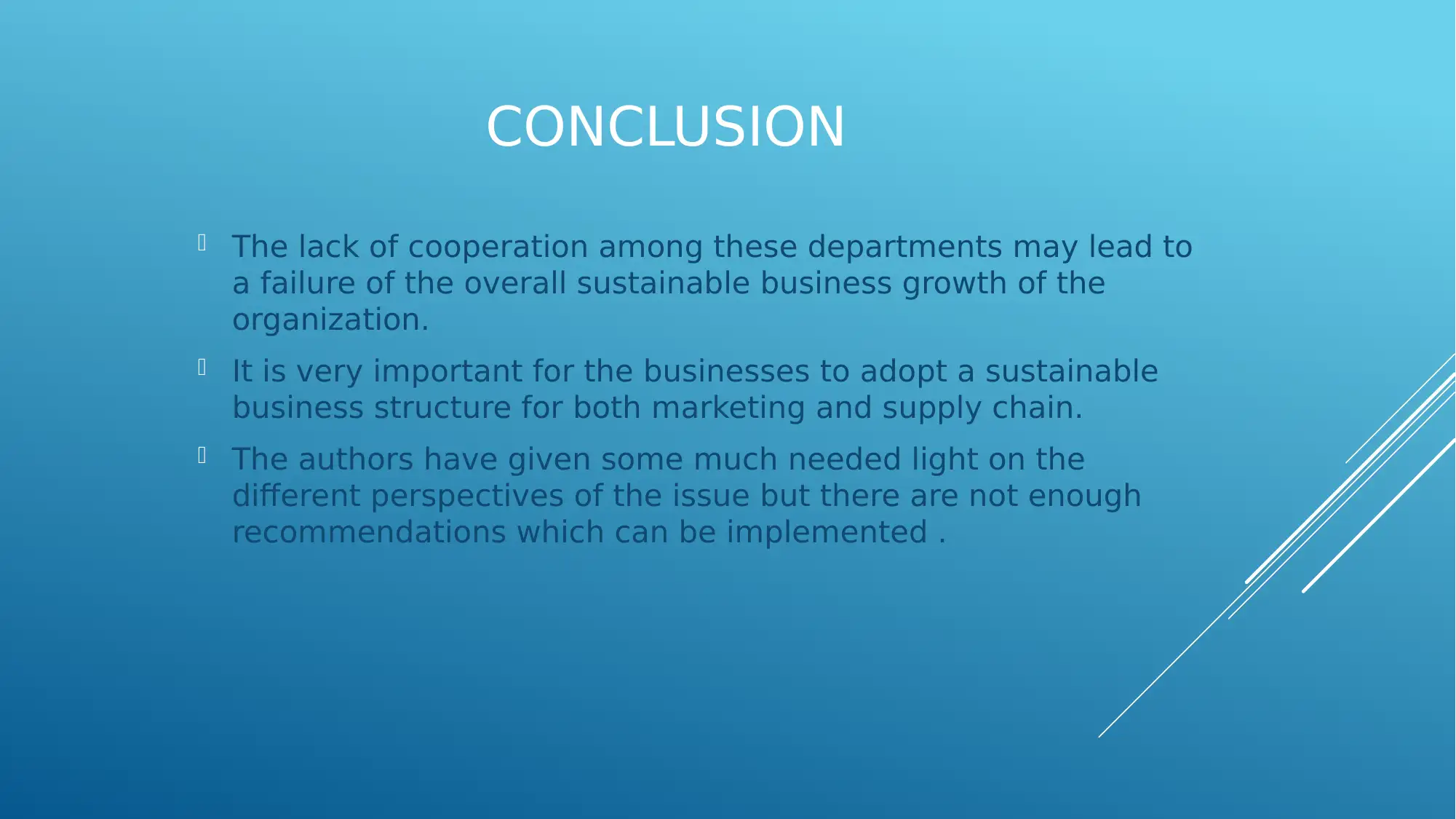
CONCLUSION
The lack of cooperation among these departments may lead to
a failure of the overall sustainable business growth of the
organization.
It is very important for the businesses to adopt a sustainable
business structure for both marketing and supply chain.
The authors have given some much needed light on the
different perspectives of the issue but there are not enough
recommendations which can be implemented .
The lack of cooperation among these departments may lead to
a failure of the overall sustainable business growth of the
organization.
It is very important for the businesses to adopt a sustainable
business structure for both marketing and supply chain.
The authors have given some much needed light on the
different perspectives of the issue but there are not enough
recommendations which can be implemented .
Paraphrase This Document
Need a fresh take? Get an instant paraphrase of this document with our AI Paraphraser
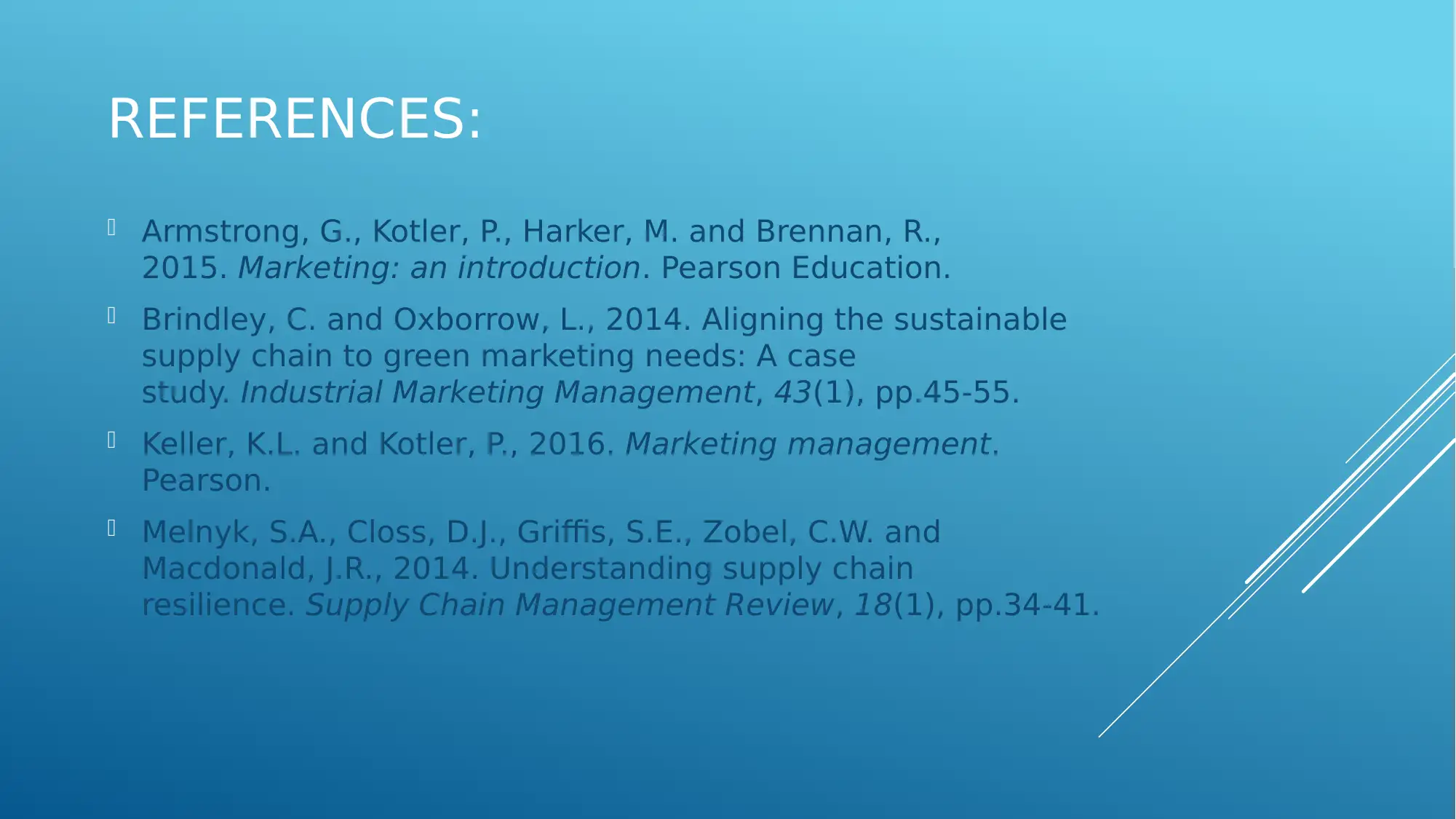
REFERENCES:
Armstrong, G., Kotler, P., Harker, M. and Brennan, R.,
2015. Marketing: an introduction. Pearson Education.
Brindley, C. and Oxborrow, L., 2014. Aligning the sustainable
supply chain to green marketing needs: A case
study. Industrial Marketing Management, 43(1), pp.45-55.
Keller, K.L. and Kotler, P., 2016. Marketing management.
Pearson.
Melnyk, S.A., Closs, D.J., Griffis, S.E., Zobel, C.W. and
Macdonald, J.R., 2014. Understanding supply chain
resilience. Supply Chain Management Review, 18(1), pp.34-41.
Armstrong, G., Kotler, P., Harker, M. and Brennan, R.,
2015. Marketing: an introduction. Pearson Education.
Brindley, C. and Oxborrow, L., 2014. Aligning the sustainable
supply chain to green marketing needs: A case
study. Industrial Marketing Management, 43(1), pp.45-55.
Keller, K.L. and Kotler, P., 2016. Marketing management.
Pearson.
Melnyk, S.A., Closs, D.J., Griffis, S.E., Zobel, C.W. and
Macdonald, J.R., 2014. Understanding supply chain
resilience. Supply Chain Management Review, 18(1), pp.34-41.

THANK YOU!
⊘ This is a preview!⊘
Do you want full access?
Subscribe today to unlock all pages.

Trusted by 1+ million students worldwide
1 out of 12
Related Documents
Your All-in-One AI-Powered Toolkit for Academic Success.
+13062052269
info@desklib.com
Available 24*7 on WhatsApp / Email
![[object Object]](/_next/static/media/star-bottom.7253800d.svg)
Unlock your academic potential
Copyright © 2020–2026 A2Z Services. All Rights Reserved. Developed and managed by ZUCOL.



